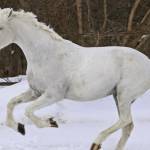Winter Horse Care: Body Condition

Despite the cold, wind, snow, sleet, and ice, your horse still needs to be fed appropriately to maintain appropriate condition. Do you know how to adjust your body-condition score (BCS) skills in cold weather?
“Furry coats, near-constant blanketing, and potential weather-driven alterations in how horses are fed, watered, exercised or otherwise managed in the winter often make BCS scoring more challenging than usual,” suggests Kathleen Crandell, Ph.D., Kentucky Equine Research nutritionist.
Horses generate heat by fermenting fiber (from hay, for example) in their hindgut. In the winter months, many horses need to generate more heat to stay warm, ergo, they often require more energy in their diet. If pasture is unavailable due to snow cover, supplementary forage may be needed, and possibly also additional concentrates.
On the other hand, some horses are perfectly able to maintain their weight on their regular diet. In such cases, no supplemental feed is necessary. Which category is your horse in?
According to Luisa Wood, nutrition advisor with Kentucky Equine Research, you can tell the difference “…by tracking weight changes every few weeks through the winter, which uncovers the situation of heavy-coated horses that appear fat when they are actually losing weight. Likewise, horses that leave some hay untouched may seem to have been overfed.”
There are several BCS scales available, one of the more popular being a 1–9 point scale where an ideal BCS is in the 5–7 range. Although appearing to be a visual scale, furry, blanketed horses need a hands-on assessment to more accurately assess ribs and fat pads.
In general, if a horse is cleaning up their feed at every meal, seems to be cold/shivering, and has a steadily decreasing BCS, then supplementary feed is likely necessary to maintain a healthy BCS. Be aware, however, that some horses do not clean up their feed if the hay is a poorer “winter” quality, or if they have poor dentition, and they could still be hungry.
“It is also possible they are leaving weeds, rough plants, or flakes containing mould. Inspect the rejected material and purchase better-quality hay if necessary,” advises Wood.
Finally, groups of pastured horses need to be have their BCS individually monitored to ensure horses lower in the pecking order have adequate access to hay.








